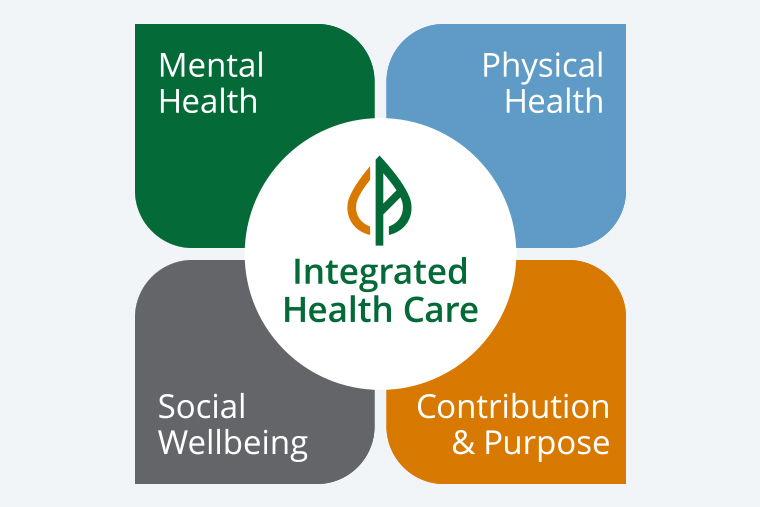Integrated Health Care Addresses the Whole Person

Much has been written about integrated health care over the past few years. At its core, integrated care offers a whole-person approach that addresses mental and physical health in a way that connects both, in order to coordinate a greater level of care. Integrated care can offer the following benefits:
- Greater access to a broad spectrum of multi-disciplinary health care services
- A coordinated plan of care among all care providers
- More support for a person’s overall emotional and physical well-being
- Community-based social support services
- The convenience of a single healthcare facility
“As a behavioral healthcare organization, if we don’t also address the physical health needs of the people we serve, then we’re really doing those we serve a disservice because the two are so interrelated,” explains Carole Boye, Community Alliance CEO. An integrated approach to health care essentially takes the different pieces of the health care puzzle and fits them to match a client’s individual needs.
The Elements of Integrated Health Care
“We believe that access to a whole person approach, addressing physical, mental and social needs, is essential to improving both health and quality of life,” said Boye. “Our integrated care model is framed by SAMHSA’s definition of recovery, and the multiple pillars that are necessary to support recovery.”
Recovery is defined by SAMHSA as “A process of change through which individuals improve their health and wellness, live a self-directed life and strive to reach their full potential.”
The pillars of recovery include:
- Mental Health – Overcoming or managing one’s symptoms, preventing or mitigating long-term impairment and achieving emotional stability
- Physical Health – Access to preventative, acute and chronic care that improves one’s health and overall wellness, and promotes informed, healthy choices
- Home –Having a safe and stable place to live
- Purpose – Engaging in meaningful daily activities, such as a job, school, volunteerism or creative endeavors, and the independence, economic security and resources to participate as a contributing citizen
- Community – Creating and sustaining positive relationships and social networks that provide support, friendship, love and hope
Offering Care that Can Save Lives
“For years and years, we’ve talked about holistic care, but we’re understanding so much more about the interrelationship between our physical bodies, our mental state of mind and even our environment or living conditions,” Boye offered. “We made the decision to expand services to offer integrated care when statistics surfaced that people with mental illness die, on average, 20 to 25 years earlier than those who don’t experience serious mental illness,” Boye exclaimed. “And 80% of those deaths are attributable to preventable illnesses. We were seeing this among our own clientele. People in their 40’s and 50’s were dying, not of their mental illness, but from heart attacks and respiratory disease. It became not only a professional imperative, but a moral imperative to figure out a way to address this.”
Research has revealed that people with a mental illness are more likely to not have a primary care physician. They’re less likely to have immunizations and preventative care. Some studies by the National Institute for Mental Health (NIMH) found that people with mental illness receive worse care from the healthcare system – attributed to the fact that healthcare workers are not trained to handle populations with mental health issues. Boye explained that it wasn’t uncommon for healthcare staff to misattribute physical symptoms as mental health conditions. “For example, if a person with a mental health condition walks into an emergency room and complains of chest pain and the staff learns the patient is on an anti-anxiety or psychotropic medication, there’s a greater chance they’ll say ‘Oh, you’re having an anxiety attack, go home and relax,’ then they are to say, ‘Hey, we may have a heart issue going on here.’”
Boye went on to describe an interaction a client related about a visit to an emergency room. “The attending healthcare worker started speaking to the client louder, as if a mental disorder somehow indicated hearing loss. And they talked to him like he was a two-year old, like he had lost all intellect.” When patients feel unheard or disrespected, they’re less likely to reach out for the medical attention they need. “That’s why, from the beginning, we made it a priority to listen to our clients and their stories, and to develop the kind of mutual respect that I expect from my own primary care doctor,” Boye added.
Integrated Care that Goes Beyond
Boye also noted the impact stable housing, social connectedness and economic security can have on health and recovery. She explained that this is why not to overlook the importance of including these elements within Community Alliance’s whole person, integrated care approach. “Studies show that only 10 – 20% of total health care costs are spent on medical care,” Boye related. The balance is spent on these other needs, generally referred to as social determinants of health. “Let’s think about this”, Boye continued, “it makes sense. If I don’t have enough money to buy food, how am I going to eat healthier or pay for the medicine I’m supposed to take? And if I don’t have access to transportation, how am I going to keep my doctor’s appointments?”
More recently, COVID-19 has only exacerbated these challenges – exposing alarming disparities among those already struggling. Economic instability, social isolation, lack of family connectedness, food insecurity, job loss and the threat of losing housing have taken a real toll.
“I’m proud to say that Community Alliance is working hard to meet the full range of needs experienced by those we serve. We are the only community mental health organization in Nebraska that has chosen to embed primary care into the agency, as opposed to embedding mental health into primary care. Research tells us that this approach is more effective with our population of focus,” Boye asserted. “And we have quickly flexed our services to try to respond to the immediate and growing needs of our community that have been presented by the coronavirus.”
“Our mission statement says it all – helping people to live, work, learn and contribute in their community, and helping them achieve their unique potential. We’re truly committed to a whole-person approach.”
Integrated Health Care: A Professional and Moral Imperative
“People with mental illness die, on average, 20 to 25 years earlier than those who don’t experience mental illness. And 80% of those deaths are attributable to preventable illnesses.”
– Carole Boye
Help is Within Reach
We offer a full range of integrated health services including primary and psychiatric care, mental health and substance use counseling, rehabilitation and employment services, supportive housing, community, family and peer supports and more.



